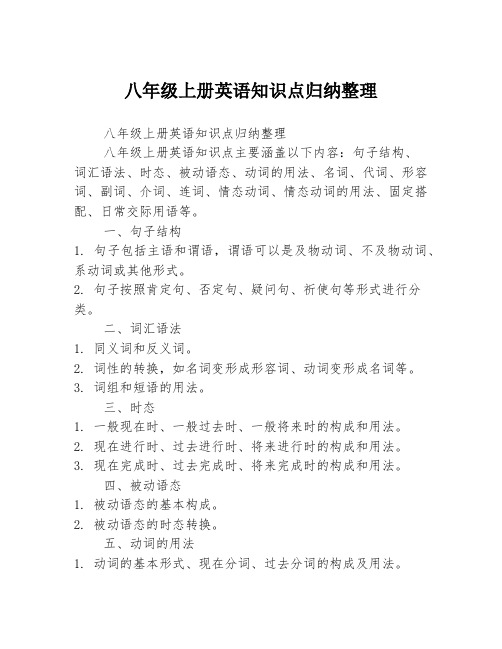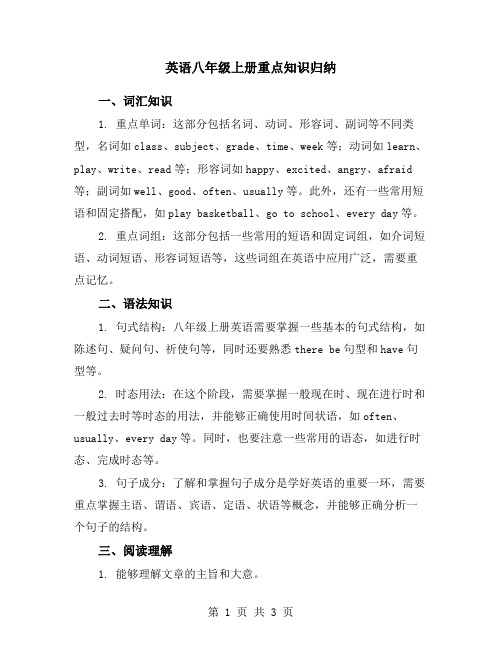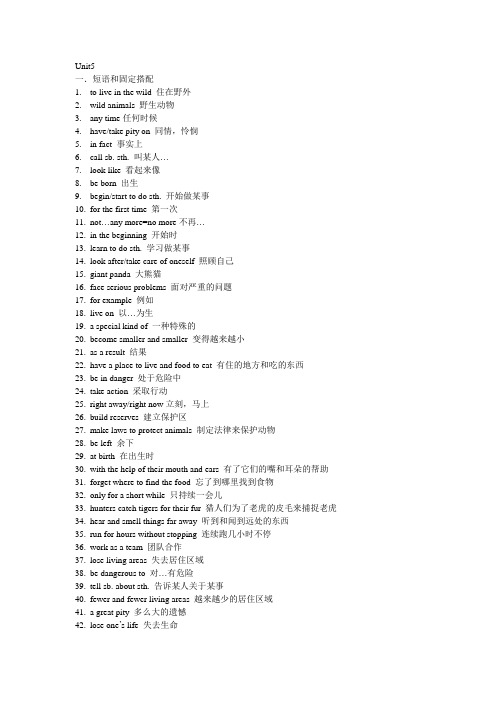2014年秋八年级英语上册知识点总结完整版
八年级上册英语知识点归纳整理

八年级上册英语知识点归纳整理八年级上册英语知识点归纳整理八年级上册英语知识点主要涵盖以下内容:句子结构、词汇语法、时态、被动语态、动词的用法、名词、代词、形容词、副词、介词、连词、情态动词、情态动词的用法、固定搭配、日常交际用语等。
一、句子结构1. 句子包括主语和谓语,谓语可以是及物动词、不及物动词、系动词或其他形式。
2. 句子按照肯定句、否定句、疑问句、祈使句等形式进行分类。
二、词汇语法1. 同义词和反义词。
2. 词性的转换,如名词变形成形容词、动词变形成名词等。
3. 词组和短语的用法。
三、时态1. 一般现在时、一般过去时、一般将来时的构成和用法。
2. 现在进行时、过去进行时、将来进行时的构成和用法。
3. 现在完成时、过去完成时、将来完成时的构成和用法。
四、被动语态1. 被动语态的基本构成。
2. 被动语态的时态转换。
五、动词的用法1. 动词的基本形式、现在分词、过去分词的构成及用法。
2. 动词的逻辑主语和关系代词。
六、名词1. 单数名词和复数名词的区别,复数名词的构成规则。
2. 可数名词和不可数名词的区别。
七、代词1. 人称代词、物主代词、反身代词的用法。
2. 指示代词、不定代词的用法。
八、形容词1. 形容词的一般用法。
2. 最高级和比较级形容词的构成和用法。
九、副词1. 副词的一般用法。
2. 最高级和比较级副词的构成和用法。
十、介词1. 常见的介词及其用法。
十一、连词1. 常见的连词及其用法。
十二、情态动词1. can、could、may、might、shall、should、will、would、must、need等情态动词的用法。
十三、情态动词的用法1. 表示能力、可能性、许可、请求、建议、必须等。
2. 情态动词表将来时态的用法。
十四、固定搭配1. 常见的固定搭配及其用法。
十五、日常交际用语1. 日常交际中常用的问候语、道歉、表示感谢等用语。
以上为八年级上册英语知识点的归纳整理,涵盖了语法、词汇、句型、语用等多个方面的内容。
2014年八年级上册英语第三单元知识点归纳

2014年八年级上册英语第三单元知识点归纳Unit3 I'm more outgoing than my sister.一、重点短语1.. more outgoing 更外向2.as…as…与……一样……3.the singing competition 唱歌比赛4.be similar to 与……相像的/类似的5.the same as 和……相同;与……一致6.be different from 与……不同7.care about 关心;介意8.be like a mirror 像一面镜子9.the most important 最重要的10.as long as 只要;既然11.bring out 使显现;使表现出12.get better grades 取得更好的成绩13.reach for 伸手取14.in fact 事实上;实际上15.make friends 交朋友16.the other 其他的17.touch one’s heart 感动某人18.be talented in music 有音乐天赋19.be good at 擅长……20.be good with 善于与……相处21.have fun doing sth. 享受做某事的乐趣22.be good at doing sth 擅长做某事23.make sb. do sth. 让某人做某事24.want to do sth. 想要做某事25.as+adj./adv.的原级+as 与……一样……26.It’s+ adj.+for sb. to do sth. 对某人来说,做某事……的。
二.重点语法(一) 重点句型1. Both Sam and Tom can play the drums, but Sam plays them better thanTom. 萨姆和汤姆都会打鼓,但是萨姆比汤姆打得要好一些。
both (1) 表示“两者都”,both用在含有be动词的句中,应放在be动词的后面;用在含有行为动词的句中,应放在行为动词的前面,(2) both…and…表示“两者都”,both...and在句中连接并列成分,如主语、谓语、表语、宾语等,位置比较灵活。
英语八年级上册重点知识归纳

英语八年级上册重点知识归纳一、词汇知识1. 重点单词:这部分包括名词、动词、形容词、副词等不同类型,名词如class、subject、grade、time、week等;动词如learn、play、write、read等;形容词如happy、excited、angry、afraid 等;副词如well、good、often、usually等。
此外,还有一些常用短语和固定搭配,如play basketball、go to school、every day等。
2. 重点词组:这部分包括一些常用的短语和固定词组,如介词短语、动词短语、形容词短语等,这些词组在英语中应用广泛,需要重点记忆。
二、语法知识1. 句式结构:八年级上册英语需要掌握一些基本的句式结构,如陈述句、疑问句、祈使句等,同时还要熟悉there be句型和have句型等。
2. 时态用法:在这个阶段,需要掌握一般现在时、现在进行时和一般过去时等时态的用法,并能够正确使用时间状语,如often、usually、every day等。
同时,也要注意一些常用的语态,如进行时态、完成时态等。
3. 句子成分:了解和掌握句子成分是学好英语的重要一环,需要重点掌握主语、谓语、宾语、定语、状语等概念,并能够正确分析一个句子的结构。
三、阅读理解1. 能够理解文章的主旨和大意。
2. 能够理解文章的细节和事实。
3. 能够根据上下文猜测生词的意思。
4. 能够理解作者的观点和态度。
5. 不断提高阅读速度和理解能力。
四、写作知识1. 写作技巧:掌握一些基本的写作技巧,如正确的语法、拼写和标点符号,以及正确的文章结构等。
2. 写作实践:通过不断的写作练习,提高自己的写作能力。
除此之外,八年级上册英语还需要注意以下几个方面:1. 听力训练:每天坚持进行听力训练,提高听力理解能力。
2. 口语表达:鼓励学生多进行口语练习,提高口语表达能力。
在口语表达中要注意语音、语调和语速等方面的问题,同时也要注意表达的准确性和得体性。
八年级上册英语知识点总结归纳

八年级上册英语知识点总结归纳八年级英语知识点总结(上)一、语法知识1. 一般现在时:肯定句:主语+动词原形否定句:主语+don’t/doesn’t+动词原形疑问句:Do/Does+主语+动词原形2.一般过去时:肯定句:主语+动词过去式否定句:主语+didn’t+动词原形疑问句:Did+主语+动词原形3.现在进行时:肯定句:主语+am/is/are+动词ing否定句:主语+am/is/are+not+动词ing疑问句:Am/Is/Are+主语+动词ing?4.过去进行时:肯定句:主语+was/were+动词ing否定句:主语+was/were+not+动词ing疑问句:Was/Were+主语+动词ing?5.一般将来时:肯定句:主语+will+动词原形否定句:主语+will+not+动词原形疑问句:Will+主语+动词原形?6.现在完成时:肯定句:主语+have/has+动词过去分词否定句:主语+have/has+not+动词过去分词疑问句:Have/Has+主语+动词过去分词?7.被动语态:肯定句:S+be+过去分词(如is made)否定句:S+be+not+过去分词(如is not made)疑问句:Be+S+过去分词(如Is he made?)8.情态动词:情态动词can表示能力、情态动词may表示可能性、情态动词must表示肯定、情态动词should表示建议二、词汇与用法1.主要时态动词:am, is, are, was, were, have, has, had, do, does, did, will2.数字、日期数字:英文数字0~9读法;10及以上的数字都是由个位数开始读;如20为twenty;30为thirty。
对于100及以上的数字,每三位为一组,组间用and连接。
日期:月份全称首字母大写并加上序数词,如January 1st。
3.动物、颜色、服装动物:动物的名称和外形等;颜色:基础颜色的单词;服装:常见的服装单词。
2014-2015学年八年级上期末复习讲义-U5-8重点知识梳理

Unit5一.短语和固定搭配1.to live in the wild 住在野外2.wild animals 野生动物3.any time任何时候4.have/take pity on 同情,怜悯5.in fact 事实上6.call sb. sth. 叫某人…7.look like 看起来像8.be born 出生9.begin/start to do sth. 开始做某事10.for the first time 第一次11.not…any more=no more不再…12.in the beginning 开始时13.learn to do sth. 学习做某事14.look after/take care of oneself 照顾自己15.giant panda 大熊猫16.face serious problems 面对严重的问题17.for example 例如18.live on 以…为生19.a special kind of 一种特殊的20.become smaller and smaller 变得越来越小21.as a result 结果22.have a place to live and food to eat 有住的地方和吃的东西23.be in danger 处于危险中24.take action 采取行动25.right away/right now立刻,马上26.build reserves 建立保护区27.make laws to protect animals 制定法律来保护动物28.be left 余下29.at birth 在出生时30.with the help of their mouth and ears 有了它们的嘴和耳朵的帮助31.forget where to find the food 忘了到哪里找到食物32.only for a short while 只持续一会儿33.hunters catch tigers for their fur 猎人们为了老虎的皮毛来捕捉老虎34.hear and smell things far away 听到和闻到远处的东西35.run for hours without stopping 连续跑几小时不停36.work as a team 团队合作37.lose living areas 失去居住区域38.be dangerous to 对…有危险39.tell sb. about sth. 告诉某人关于某事40.fewer and fewer living areas 越来越少的居住区域41.a great pity 多么大的遗憾42.lose one’s life 失去生命43.act to do sth. 采取行动做某事44.a report on bears 关于熊的报告45.move around 四处移动46.in the daytime 在白天47.take action to do sth. 采取行动做某事48.look so cute 看起来如此可爱49.at four months old 在四个月大的时候50.no way不可能51.what a shame 不像话二.重点句子及其讲解(见单元学案)1.Would you like to live in the wild?2.Could you please not eat them?3.What wild animal do you like best?4.When Xiwang was born, she weighed just 100 grams and looked like a white mouse.5.At four months old, she weighed about eight kilograms and started to go outside for the firsttime.6.For example, it is very difficult for them to have babies, and many baby pandas die when theyare very young.7.Also, giant pandas live mainly on a special kind of bamboo.8.If we do nothing soon there may be none left.三.语法I.情态动词may的用法II.动词不定式做宾语III.构词法:动词或形容词加后缀变为名词:-ing; -ness; -ionUnit6一.短语和固定搭配1.at the market 在市场是上2.long thin neck 细长的脖子3.brown and grey feathers 棕灰色的羽毛4.broad wings 宽阔的翅膀5.rare birds稀有鸟类6.nature reserve自然保护区7.one of the world’s most important wetlands 世界上最重要的湿地之一8.provide sth. for sb. = provide sb. with sth. 提供某物给某人provide food and cover for a lot of wildlife 给许多的野生动物提供食物和避难所9. a perfect place for some rare birds 对于一些稀有鸟类的完美的地方10.all year round 一年到头11.only for a short stay 只做短暂停留12.in order to 为了13.have more space for farms an buildings 有更多的空间给农田和建筑物14.lead to导致15.less and less space for wildlife 给野生动物越来越少的空间16.keep doing 持续做某事keep sb. from doing=prevent sb. from doing=stop sb. from doing 阻止某人做某事prevent sth. from happening 阻止某事发生protect sb. from sth. 保护…免受…17.have enough food to eat 有足够的食物来吃18.record the types and changes in numbers 记录种类和数量上的变化19.invite sb. to do sth. 邀请某人做某事ask sb. to do sth. 请求某人做某事20.count and describe the birds 记录和描述鸟类21.understand the importance of the wetlands 理解湿地的重要性22.the importance of wetland for wildlife 湿地对于野生动物的重要性23.take photos of the birds 拍鸟的照片24.write down 写下,记下25.learn more about sth. 学习更多关于某事物26.cover and area of…覆盖…面积27.be home to…是…的家28.not only…but also…不仅…而且…29.all over the world全世界30.a pair of binoculars 望远镜31.write down what you see 记下你看到的32.date of birth 出生日期33.application form 申请表34.the natural world 自然世界35.become a member of …成为…的一员36.take part in activities 参加活动37.call sb. on…按…给某人打电话38.email sb. at…按…给某人发邮件39.make sb. do sth. 让某人做某事40.take sth. with sb. 某人随身携带某物41.what else 其它什么42.types of cranes 鹤的种类43.as a result 结果44.make laws 制定法律45.spend the winter 度过冬天46.introduce oneself 自我介绍47.encourage sb. to do sth. 鼓励某人做某事48.description of the birds 关于鸟的描述49.many cranes left 剩下的许多鹤50.be interested in doing sth. 对做某事感兴趣二.重点句子及其讲解(见单元学案)1.How many types of cranes are there in the world?2.Many birds of live in Zhalong all year round, while some go there only for a short stay.3.Most birds are active in the daytime, so you can easily watch them there.4.There are not many cranes left in the world, and 40 per cent of them live in Zhalong.5.Some people want to make the wetlands smaller in order to have more space or farms andbuildings.6.Now the Chinese government has made laws to prevent all these things in Zhalong.7.Yangcheng Nature Reserve is home to different kinds of plants and rare birds.8.We should protect the wetlands not only because they are home to many plants, birds andanimals, but also because they are important to the health of people all over the world.9.I am very interested in learning about different kinds of plants, birds and animals.三.语法I.动词不定式做目的状语II.构词法:动词和名词加后缀变为名词–er; -or; -istUnit7一.短语和固定搭配1.too cold 太冷2.bring sb. sth. 带给某人某物3.bet that…打赌…4.look cool and feel cool with nothing on什么都不穿的话会看起来酷,还会感觉冷5.the best time to do sth. 做某事最好的时候6.be full of=be filled with 充满…7.forget to do sth. 忘记去做某事forget doing sth. 忘记做过某事8.fly far away 飞远9.sweet memories of…美好的回忆10.turn brown变棕色11.harvest crops丰收谷物12.the temperature drops 温度下降13.sth. rhymes with sth. 某物与某物押韵14.a perfect time to fly a kite 放风筝的最佳时间15.fall on the floor 掉落到地上16.fly away to 飞远到…17.the temperature rises 温度上升18.drop below zero 降到零度以下19.stay above zero 留在零度以上20.a bit 有一点21.a strong snowstorm 强烈的暴风雪22.blow hard 刮得猛烈23.cause a lot of problems 导致许多问题24.be covered in deep white snow 被深深的白雪覆盖25.have a big snowball fights 打一场打雪仗26.throw snowballs at each other 互相朝对方扔雪球27.be busy doing sth. 忙于做某事28.catch a bad cold 得重感冒29.ring sb. 打电话给某人30.have a high fever 发高烧31.cough a lot 咳嗽的厉害32.be perfect for doing sth. 适合做某事33.the rest of…剩余的二.重点句子及其讲解(见单元学案)1.It’s the best time to play football outside.2.What a perfect time to fly a kite.3.How are you doing?4.The sudden heavy rain causes a lot of problems.5.We throw snowballs at each other, screaming and laughing.6.I bet you’ll look cool and feel cool with nothing on!三.语法I.动词的种类II.句子成分分析III.构词法:名词加后缀变形容词–yUnit8一.短语和固定搭配1.natural disasters 自然灾害2.be all wet全是湿的3.wake up醒来e with me和我一起5.mop up拖干净6.lose final决赛失利7.thousands of成千上万8.car accident汽车事故9.crash into猛撞10.wash away冲走11.start big fire引发大火12.fall from tree从树上跌下来13.hear about听说14.tell/speak/say/talk15.a heavy storm大风暴16.catch fire着火be on fire17.in the early morning 大清早18.feel a slight shake感到轻微的震动19.hear a loud noise like thunder听到像雷声一样的响亮的噪音20.scream in fear害怕得尖叫21.run out of从…跑出22.try one’s best to do sth. 尽某人最大的努力做某事23.run in all directions 朝四面八方跑24.fall down落下e down崩塌26.the noise and shaking end噪音和震动结束了27.not…at all一点也不28.heart beats fast心脏跳得快29.be trapped困住的30.calm down冷静31.shout for help大声呼救32.find one’s way out找到某人的出路33.hear shouts听到喊叫声34.move away移走35.at last最后36.be asleep睡着的37.in the same direction朝一样的方向38.break down(车辆)出障碍;坏掉39.because of由于40.fall over跌落41.make a big snowball做一个大的雪球42.hide behind a tree藏在树后面43.run toward朝…跑去44.get out出去45.as soon as possible尽快46.be on fire着火47.keep oneself safe from fires保护自己安全免受火的伤害48.stay away from远离49.hear the wind blowing听到刮风的声音二.重点句子及其讲解(见单元讲义)1.I was sleeping when it started to rain.2.There was a heavy storm with thunder and lightning.3.Lightning hit a classroom building and it caught fire.4.Soon the real noise came, like bombs under the ground.5.Outside, people were running in all directions while pieces of glass and bricks were fallingdown.6.I could not see anything at all, and I did not know if anyone else was near me.7.I felt nervous and my heart was beating fast.8. A moment of fear went through my mind, but I told myself to calm down since I was stillalive.9.I started to pull myself slowly through the dark.10.Hours later, as I was trying to find my way out, I suddenly heard some noise above me.11.Timmy was trapped in a dark place after the earthquake stopped.12.Cover your mouth and nose with a wet towel to protect yourself from the smoke.13.Who will mop up the water if I go home without you?14.Luckily, there was just enough space for me to move.三.语法I.过去进行时的构成和用法II.When/as/while引导的时间状语从句。
八年级上册英语知识点归纳总结

八年级上册英语知识点归纳总结3.八班级上册英语学问点归纳总结篇三1.确定形式:主语+动词过去式+其它。
2.否定形式:主语+didn't+谓语动词原形+其它。
3.一般疑问句:①Did+主语+谓语动词原形+其它?②Was/Were+主语+表语?4.特别疑问句:疑问词+did+主语+动词原形+其它?5.一般过去时记忆口诀一般过去时并不难,过去动作、状态记心间。
动词要用过去式,时间状语句末站。
否定句很简洁,didn't站动原前,其它部分不要变。
一般疑问句也好变,did放句子前,主语、动原、其它部分依次站立。
特别疑问句也简洁,疑问词加一般疑问句记心间。
一般过去时表示过去某个时间或某一段时间内发生的动作或存在的状态,常和过去的时间状语连用。
4.八班级上册英语学问点归纳总结篇四英语中有两种语态:主动语态和被动语态。
主动语态表示主语是动作的执行者。
被动语态表示主语是动作的承受者。
一般现在时的被动语态表示现阶段常常性、习惯性的被动动作,由“主语+ am/is/are + 及物动词的过去分词(+by+ 动作执行者)”构成。
例如:The yard is cleaned (by someone) every morning. 院子每天早上都有人打扫。
当我们不知道谁是动作的执行者,或不用指出动作的执行者,而需要强调动作的承受者时,就要用被动语态。
例如:Mobile phones are mainly used to keep in touch with other people. 手机主要被用来和其他人保持联系。
一般现在时的被动语态的一般疑问句是将be 提至句首;否定句是在be 后加not。
例如:Is Chinese spoken by many people? 很多人说汉语吗?The little girl is not looked after by her mother. 这个小女孩不是由她的妈妈照看。
人教版八年级英语上册第四单元知识点总结

环球雅思教育学科教师讲义副校长/组长签字:签字日期:China...)如Tara is the youngest of all. 塔拉在所有人中最年轻。
Lindadraws(the) most carefully inher class.琳达是班里绘画最认真的。
注:1)副词的最高级前可省略“the”:如:sit(the)most comfortably 坐得最舒适2)最高级前有其它的限定词时,不加“the”。
如:my best friend2.Which /Who …+the +最高级…,A,B or C?e.g. Whichdo you like(the) best,apples,pears or oranges? 苹果、梨和橘子中你最喜欢哪个?3. oneof+the +最高级(形)+名(复)e.g. Jack Chen isone of the most famous actors inthe world.成龙是世上最著名的演员之一。
4.the+序数词+最高级(形)+名(单):e.g. Hainan is thesecond largest island inChina. 海南是中国第二大岛。
5. This isthe +最高级(形)+名(单)+ that 从句:e.g. This is theworstmovie that I haveever seen. 这是我曾经看过的最糟糕的电影。
6. a +最高级(形)+ 名(单): 表示...非常e.g. Springis a best season.春天是最好的季节。
三.原级、比较级、最高级的相互转换1、原级与比较级的转换:比较级+than→ not...as/so...as...e.g. He speaks more loudly thanme.→I don‘t speakas/so loudlyas he/him.。
八年级上册英语全部知识点

八年级上册英语全部知识点八年级英语是一个重要的阶段,这个阶段主要通过学习英语语法,掌握基础词汇和语言技能,提高对英语的理解能力和运用能力。
下面是八年级上册英语全部的知识点:语法1. 现在进行时:be+现在分词- 表示现在正在发生的动作- 常用时间状语:now, at the moment等2. 过去时:动词过去式- 表示过去发生的动作- 常用时间状语:yesterday, last week等3. 一般将来时:will+动词原形- 表示将要发生的动作- 常用时间状语:tomorrow, in the future等4. 情态动词- can/could, may/might, will/would, shall/should, must等- 表示能力、推测、意愿、命令、必须等情态5. 被动语态- be+过去分词- 表示动作的承受者是主语,强调动作的结果而非动作的执行者6. 宾语从句- 引导词包括that, if, whether, how等- 在句中作宾语7. 定语从句- 引导词包括that, which, whose, who等- 在句中修饰名词或代词词汇1. 常用动词- be, have, do, go, take, make, come等2. 易混淆词汇- good/well, bad/badly, usually/often等- 意义相近的单词3. 常用名词- person, place, thing, time等4. 常用形容词- big, small, tall, short, interesting, boring等5. 常用副词- slowly, fast, loudly, softly, well等语言技能1. 听力- 听懂基础日常英语对话和简单文章- 通过听写、跟读等训练来提高听力水平2. 口语- 练习日常英语对话,提高口语表达能力- 练习独白和演讲,提高流利度和语感3. 阅读- 阅读简单的英语文章,掌握基础单词和表达方式- 阅读英文小说和资料,提高阅读理解能力4. 写作- 练习书写英文单词和句子,提高写作质量- 练习写作各类文章,如日记、信件、作文等以上就是八年级上册英语全部知识点。
- 1、下载文档前请自行甄别文档内容的完整性,平台不提供额外的编辑、内容补充、找答案等附加服务。
- 2、"仅部分预览"的文档,不可在线预览部分如存在完整性等问题,可反馈申请退款(可完整预览的文档不适用该条件!)。
- 3、如文档侵犯您的权益,请联系客服反馈,我们会尽快为您处理(人工客服工作时间:9:00-18:30)。
八年级上册英语(2014年秋季版)语法、短语和知识点总结Unit 1 Where did you go on vacation?本单元的话题:谈论假期活动内容,复习一般过去时。
本单元的语法:1.复习一般过去时;2.学习不定代词和不定副词的用法。
2.不定代词和不定副词的用法:(1)左边的some、any、every、no与右边的body、one、thing构成不定代词,some、any、every、no与右边的疑问副词where构成不定副词;(2)一般情况下以some开头的不定代词和不定副词用于肯定句,以any开头的不定代词和不定副词用于否定句、疑问句;以no开头的不定代词和不定副词表示否定含义(no one为两个单词);(3)不定代词或不定副词和形容词连用时,形容词放在后面。
He has something important to do.他有重要的事情要做。
(肯定句用something,形容词important 放后)Did you buy anything special? (一般疑问句用anything,形容词special放后)Did you go anywhere interesting last month?上个月你去令人感兴趣的地方了吗?(一般疑问句用不定副词anywhere,形容词interesting放后)(4)不定代词和不定副词做主语时,后面的动词用单数形式。
Everone is here today.今天每个人都在这里。
本单元的短语和知识点:1. go on vacation去度假 go to the mountains 上山/进山2.stay at home呆在家go to the beach去海滩 visit museums 参观博物馆 go to summer camp 去参观夏令营3. study for tests为考试而学习\备考 go out出去4. quite a few相当多,不少(后跟可数名词复数)take photos照相 most of the time大部分时间5.buy sth for sb = buy sb sth为某人买某物6. taste good. 尝起来很好taste(尝起来)、look(看起来)、sound(听起来)为感官动词,后跟形容词7.have a good\great\fun time过得高兴,玩得愉快(=enjoy oneself) 8. go shopping去购物9. nothing…but+动词原形:除了……之外什么都没有He had nothing to do at home but read yesterday.昨天他在家除了读书无事可做。
10. seem to do sth:好像…I seem to know him.我好像认识他。
seem+(to be)+形容词:看起来…The work seems(to be)easy.这工作看起来很容易。
11.keep a diary记日记12. in+大地方:达到某地(get to +地方:达到某地)arrive at+小地方:达到某地 (get的过去式为got)若是arrive和get后跟home、there、here三个地点副词,后面的介词in\at\to必须去掉。
Tom got home yesterday evening=Tom arrived home yesterday evening.昨晚汤姆到家。
13.decide to do sth:决定做某事14. try doing sth.尝试做某事try to do sth.尽力去做某事15. feel like给…的感觉;感受到 16. in the past 在过去 walk around四处走走enjoy doing sth:喜欢做某事 difference(名词,差异,差别)---- different(形容词,不同的)18.start doing sth:开始做某事(= start to do sth)19.19.over an hour一个多小时(over超过,多余 = more than)20. too many 太多,后接可数名词复数。
too much 太多,后跟不可数名词,修饰动词作状语。
much too 太,后跟形容词或副词,分辨三者的口诀: too much, much too, 用法区别看后头:much 后接不可数,too 后修饰形或副。
too many 要记住,后面名词必复数。
21.because of 因为,后接名词、代词或动名词(即动词+ing),不能接句子。
because因为,后跟句子。
He was late for school because of get ting up late.他因为起晚而上学迟到。
(get为动词)= He was late for school because he got up late.22.enough(足够的)与名词连用,一般放在名词前He has enough money .23.enough(足够的)与形容词或副词连用,enough放在后面。
He is old enough to go to school.24. doing sth.忘记已经做过某事(已经做完)Forget to do sth.忘记去做某事(还未做)(forget的过去式为forgot)25. so+形容词+that+句子:如此…以至于…too+形容词+to do sth:太…以至于不能…形容词+enough to do sth:足够…能够做某事(注意三个句型有时可以互换)He is so young that he can′t go to school.= He is too young to go to school.= He isn′t old enough to go to school.Unit 2 How often do you exercise?本单元的话题:谈论生活习惯,复习一般现在时。
本单元的语法:1.复习一般现在时;2.学习表示频率副词的用法。
主要频率副词的等级排序:always(总是) > usually (通常) > often(经常) > sometimes(有时) > hardly ever(很少) > never(从不)这些副词在句子中的位置,一般放在助动词、be动词或情态动词之后,行为动词之前。
即:“行”前“助(系)”后。
Peter is always late for school. Peter上学总是迟到。
I usually do my homework in the evening. 我通常在晚上做作业。
提问 always, sometimes, twice a day 等频率副词,用How oftenI watch TV every day.我每天都看电视→How often do you watch TV?(你多长时间看一次电视?)本单元的短语和知识点:1.on weekends在周末 go to the movies去看电影 help with housework帮助做家务 how often多久一次 hardly ever几乎从不2.once a week每周一次 twice a week每周两次 every day每天 use the Internet用互联网be free有空Are you free on weekends?你周末有空吗?4.stay up late熬夜at least至少go to bed early早点睡觉play sports进行体育活动5.after school 放学后6.wan t sth:需要某物 He wants a new pen.他想要一支新钢笔。
want to do sth:想做某事 He wants to watch TV after school.放学后他想去看电视。
want sb to do sth:让某人做某事 My mother wants me get up early.妈妈让我早起。
7.be good for对……有好处 be bad for 对……有害处8. play computer games打电子游戏 go camping去野营 9.ask sb about sth:问某人某事My parents often ask me about my study.我的父母经常问我的学习情况。
10. in one’s spare time在某人业余时间He studies English in his spare time.11.(P13,2b)”数字+percent of+名词”做主语时,后面的单词取决于名词的情况。
若名词为复数,后面的动词用复数形式;若名词为单数或不可数名词,后面的动词用单数形式。
In our class ,twenty of students are boys. Thirty of water is dirty.12.not…at all:一点儿也不(not构成否定句)I don’t like the movie at all.13.go online上网=surf the Internet 14.the answer to+名词:…的答案16.the (best) way to do sth: 做某事的(最好)方式The best way to learn English is speaking English.学习英语的最好方法是说英语.17.such as比如(后跟名词或名词短语)for example例如(后跟句子)He likes fruits,such as apples,bananas and so on.他喜欢水果,例如苹果、香蕉等。
He has some good ways to study English,for example ,he often listens to tapes.19.more than (=over)超过,多余 go to the dentist去看牙医Unit 3 I'm more outgoing than my sister.本单元的话题:谈论事物对比,学习形容词比较级。
本单元的语法:学习形容词比较级。
(语法:见课本第113页至115页)本单元的短语和知识点:1.play+the +乐器 play the drums打鼓比较play +球类 play basketball打篮球both…and…两者都(后面的动词用复数形式) Both Tom and Jim are students.3.be good at+名词\代词\V ing:擅长,在某方面做得好7.be like:像…The books are like friends.书像朋友。
